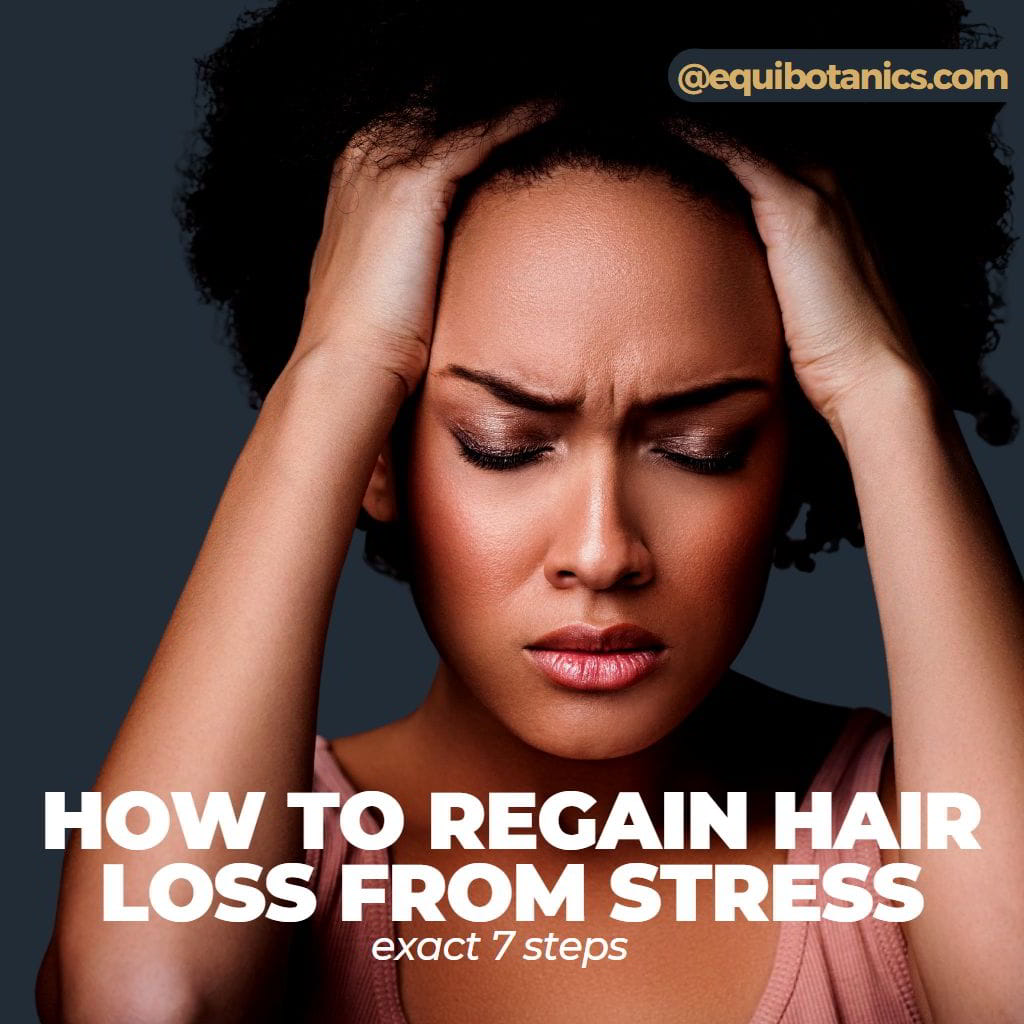
Stress-related hair loss is a common occurrence for many and can understandably cause distress. Although you may be worried that this hair loss is permanent, we’re here to tell you that, thankfully, it’s usually temporary. Better still, there are steps you can take to regrow hair that has fallen out as a result of stressful times experienced in your personal or professional life.
Read on to find out exactly how to regain hair loss from stress in 7 easy steps!
A Quick Rundown
- Hair loss due to stress is usually caused by a condition known as telogen effluvium.
- Steps to encourage hair regrowth include managing stress levels more healthily, increasing your vitamin and nutrient intake, regular exercise, ditching chemically-derived hair care products, dermatological therapies such as PRP, and medication.
- Hair can take up to a year to regrow.
Why Does Stress Cause Hair Loss?

Before we get into the 7 steps to regain hair that’s been lost because of stress, it’s important to understand just why exactly stress causes hair loss in the first place.
It’s common to think of stress as a mental health condition – which, first and foremost, it is – but it also has an impact on the body, with hair loss often being a symptom. Predominantly, hair loss is caused by a disruption to the hair cycle but when stress is the cause, it can also be due to an increase in the stress hormone, cortisol. High levels of this hormone will disrupt the usual functions of the hair growth cycle.
There are several types of hair loss that can be triggered by stress, including:
Telogen Effluvium
The most likely stress-related hair loss is telogen effluvium. This condition sees the hair follicles pushed into the resting phase of the hair cycle. In a normal hair cycle, around 90% of the follicles are in the growth phase with the remaining in the rest stage. When there’s an increase of follicles in the resting phase, there will be a substantial rise in hair shedding that can lead to an obvious and generalised thinning.
Alopecia Areata
Caused by the immune system attacking the hair follicles, alopecia areata is a type of hair loss that is typically visible in the form of round bald spots across the scalp. There are a variety of factors believed to cause this condition, with severe stress being one of them, as the hormone, cortisol, that’s released when we’re stressed, is known to impact the immune system.
Trichotillomania
This condition sees the sufferer have an irresistible urge to pull out their hair and can sometimes be caused by stress and anxiety.
Reduced Nutrients and Blocked Pores
Stress and anxiety can also cause a reduction in nutrients reaching the hair follicles, as well as an increase in sebum which can block scalp pores, both of which will prevent growth. It’s also important to note that the way the hair growth cycle works means that you won’t see hair loss at the time of the stressful event, it’s likely to be around 6-12 weeks after.
Does Stress Hair Loss Grow Back? 7 Steps to Regrowth

The good news is that, typically, stress-induced hair loss isn’t permanent, and there are steps you can take to regrow your hair. When it comes to how long hair loss from stress lasts, it can be for as much as, but not usually longer than, six months.
Whilst hair loss due to stress will grow back, it’s a journey that will require patience as it can take up to a year to see significant regrowth. With some consistent use of these important steps, you can encourage regrowth. These steps are as follows:
1. Reducing stress
Whilst it isn’t necessarily possible to stop hair loss from stress, there are plenty of steps you can take to encourage regrowth. Firstly, it is important to address the cause of the stress and work to better manage your stress levels to slow hair fall. Some popular ways to manage stress include:
- Breathwork
- Journaling
- Walks outside
- Counselling sessions
- Meditation
- Talking to friends
- Scalp massages
2. A Balanced Diet
We all know the importance of a healthy, nutritious diet for our body, but it’s also important in helping maintain hair health. Extreme diets, as well as a general lack of vitamins and nutrients, can contribute to hair loss, but when we’re stressed, there is a tendency to let basic life factors, such as what we eat, fall to the wayside.
Foods that are great for hair growth and its overall health include:
- Oily fish such as salmon, mackerel and tuna
- Chia seeds
- Flaxseed
- Nuts (especially walnuts)
- Tofu
- Soy beans
- Leafy greens (spinach, for example)
- Eggs
- Berries
3. Supplements
Of course, it isn’t just food that can help bolster your body’s vitamin and nutrient levels. Whilst we would always recommend maintaining a healthy diet, you could further support this by introducing a specific hair growth supplement.
The best vitamins to encourage hair growth include:
- Vitamin B: encourages the regeneration of healthy cells that help the hair follicles to stimulate growth.
- Vitamin D: works to produce new hair follicles and promote regrowth.
- Vitamin E: increases circulation in the scalp to stimulate hair growth.
- Zinc: strengthens hair follicles and supports overall hair growth.
- Biotin: can be referred to as vitamin B7, biotin accelerates the hair’s production of keratin which improves the follicle growth rate.
- Protein: keeps hair strong and supports follicle health.
- Iron: forms part of the process that carries oxygen to the follicles that is needed for growth.
4. Exercise
Whilst you might not instantly think of exercise as a hair loss remedy, it does help hair growth. Taking part in regular physical activity is great for hair growth as it encourages blood flow to the scalp which allows more vitamins, nutrients, and oxygen to reach the follicles.
Not only is it good internally for your locks, but the production of sweat as a result of exercise will help release the scalp’s natural oils to maintain its health and encourage growth. As well as having scalp and hair health benefits, exercise releases endorphins which are chemical hormones within the body that actively relieve stress.
Here are some of our favourite ways to exercise that are known to help hair growth:
- Jogging: Known to be one of the best forms of cardio, try at least 30 minutes of jogging at any one time to stimulate blood circulation to the scalp.
- HIIT Workouts: HIIT, or High Intensity Interval Training, is a popular form of exercise, with workouts that can provide similar health benefits to other forms of cardio exercise on a much shorter timescale.
- Yoga: Studies have shown that yoga is a great way of relieving stress, and as a low-impact exercise, it is suitable for a wide range of people. Yoga is great for hair loss as it encourages blood circulation, increases the supply of oxygen, reduces anxiety and rids the body of toxins.
5. Natural Hair Care
Keep your locks protected by switching out your products for naturally-derived alternatives that cut out hair nasties such as sulphates. Hair care ranges, such as the Afro Hair Care Growth Set, contain naturally active ingredients that’ll help keep hair moisturised and strengthened, as well as stimulating hair growth. Look for products that contain the following ingredients:
Afro Hair Care Growth Set
We've jam-packed this Growth Set with luxurious ingredients to give you a kickstart on your hair growth journey. We've selected our best-selling and hair replenishing treatments as part of the set. And because we really want you to have a great time, we're giving this set away for less than getting each product individually.
- Marula Oil
- Coconut Oil
- Peppermint Oil
- Argan Oil
- Black Seed Oil
- Jojoba Oil
It’s important to maintain a consistent hair-washing routine and not reduce how often you’re cleansing your locks. The temptation can be to stop washing hair as often as you might have noticed more strands coming out in the shower but, usually, these strands are already loose and just washed away by the water.
Hair washing will remove dirt and oil that can block follicles which will prevent growth and can cause scalp damage. Use a gentle, cleaning shampoo that’s sulphate-free. We love the Baobab Detangler & Cleanser which will hydrate both the hair and scalp.
Baobab hair Detangler & Cleanser
We prefer to avoid calling this a detangling shampoo. Instead, we call ours a detangling cleanser because it’s softening and moisturising while cleansing thoroughly. It also acts as your pre-poo detangler before you wash. Are you tired of that stripped feeling after you’ve just washed your hair? Wash your hair not strip it of its natural oils.
6. Dermatological Treatments
There are some dermatological treatments that are widely used to treat hair loss and stimulate regrowth. These include:
- Laser Therapy: Using red light therapy, laser therapy for hair growth works to expose the scalp to a low-level laser. The photons in the laser are absorbed by weak scalp cells to encourage growth.
- PRP Therapy: PRP involves withdrawing a small amount of blood from the patient, the platelets are then concentrated, and activated. These activated platelets are then reinjected back into the scalp.
Both of these treatments are relatively new in the world of hair loss, but regrowth results have been seen from both. It is recommended to combine this with other regrowth methods for maximum impact.
7. Medication
If you’re concerned about your hair loss, or struggling to see regrowth using other methods, speak to your doctor who may prescribe you Minoxidil. This medication will promote blood flow to the scalp, providing the scalp with an increase in oxygen, vitamins and nutrients to stimulate growth.
Frequently Asked Questions (FAQs)
How Long Does Hair Loss from Stress Take to Come Back?
Although stress-induced hair loss is, generally, a temporary situation, it’s important to maintain realistic expectations about your regrowth journey. Although you can see some slight signs of regrowth in as little as 3 weeks, when it comes to the overall time frame, it’s going to be at least 3 months before you see anything of significance with the total process taking up to a year.
Hair growth, on average, grows around half an inch per month but this can vary. Creating a consistent routine based around hair washing, nutrition, and more, will have a positive impact for encouraging growth and help to reverse the effects of thinning or loss.
How Do You Know if You are Losing Hair Due to Stress?
Hair loss due to stress can be hard to diagnose as it tends to occur around 6-12 weeks after the initial event. If you’re losing more than 100 strands of hair a day, you are suffering from some form of hair loss. Ruling out any other conditions that might be contributing to your hair loss can help confirm whether your fall out is stress-related or not.
Summary
Hair loss caused by stress might be a temporary situation, but that doesn’t make it any less upsetting. The sooner you work on making changes, the quicker you’ll see regrowth results. Looking at ways to manage stress levels, increase your nutrient intake, and switching to natural hair care products will all benefit your hair and scalp to reduce loss and encourage growth.


